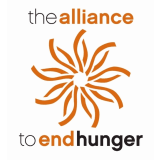The Alliance to End Hunger engages diverse institutions to build the public and political will to end hunger at home and abroad.
WHO THEY ARE
The Alliance to End Hunger develops innovative partnerships among they members; political commitment among their leaders; and global connections among groups working to end hunger worldwide. The Alliance has more than 85 members--corporations, non-profits, universities, individuals, and faith-based organizations.
THEY APPROACH
- Foster Strategic Partnerships: They initiate partnerships among they members that expand their efforts to benefit the hungry people they serve. By establishing connections between members, they facilitate collaboration on the most effective solutions to combat hunger.
- Building Political Commitment: They elevate hunger on the national agenda by encouraging their political leaders to advocate on behalf of poor and hungry people. Alliance members work together to urge leaders in Congress to use their political power to influence policy on both the national and international level.
- Hunger Free Communities Initiative: Through establishment of the Hunger Free Communities Initiative, theyconvene diverse community-led coalitions and support their work to better understand hunger within their communities. This initiative facilitates the start-up process, connects coalitions with members of Congress and other elected officials, initiates communication among groups, shares best practices, and supports the USDA Hunger Free Communities grant program in Congress.
- The National Alliance Partnership Program (NAPP): The NAPP initiative provides capacity building for Alliance organizations in six developing countries: Kenya, Uganda, Tanzania, Ethiopia, Malawi, and one Latin American/Caribbean country (TBA). Following a grant by the International Fund for Agricultural Development, the Alliance has received additional funding to continue work through 2016.

